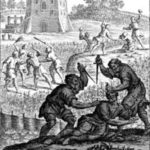We run our website the way we wished the whole internet worked: we provide high quality original content with no ads. We are funded solely by your direct support. Please consider supporting this project.

Who is Responsible for Job’s Suffering?
In the prologue of the Book of Job, the author seems to ascribe the responsibility for Job’s affliction to Yahweh. For instance, Satan challenges God to “stretch out [his] hand and strike everything he has,“ believing that this would incite Job to curse God to his face (1:11). The fact that the Lord responds by saying “[v]ery well” (vs. 12) arguably indicates that the author of this book understood Job to suffer as a result of Yahweh stretching forth his hand. This perspective is confirmed in the second encounter between Satan and Yahweh, for Yahweh points out that Job “maintains his integrity, though you incited me against him to ruin him without any reason” (2:3, emphasis added).
Taken in isolation, these statements give the impression that Yahweh personally assaulted Job. When we place them in the broader context of this work, however, we learn how the Lord brought trouble on Job. He simply removed the hedge that had up to this point been protecting Job against Satan (1:10).
Once Yahweh agrees to put his way of governing the world to a test, he tells Satan, “[e]verything [Job] has is in your power,“ and Satan even has to go out from “the presence of the Lord” to exercise this power (1:12, emphasis added, cf., 2:7). Moreover, the narrative makes it clear that every destructive thing that happened to Job was the result of Satan exercising his malevolent power. It was this malevolent power, exercised outside the presence of the Lord, that stirred up the Sabeans to kill Job’s servants and steal his livestock (1:15). And it was Satan’s power, exercised outside the presence of the Lord, that reigned down fire from the sky (1:16), that incited the Chaldeans to kill (1:17), that caused a mighty wind to collapse his house on his sons and daughters (1:18-9), and that eventually “afflicted Job with painful sores from the soles of his feet to the crown of his head” (2:8). The only role Yahweh played in of all this was initially to remove his protective hedge around Job, and this confirms our cross-informed conviction that “something else is going on” when the author seems to ascribe Job’s afflictions to Yahweh.
One of the central points the author of Job intends to make is that the theology of both Job and his friends was mistaken precisely because they consistently attributed to Yahweh the destructive activity of Satan and other malevolent forces of evil. Hence, for example, while Job and his friends disagree as to whether God is just or unjust for afflicting Job, they agree that Yahweh is the one doing this. To this extent they agree that Yahweh is the Machiavellian deity Satan accused him of being in the prologue. Moreover, though this is not apparent in translations, which typically translate the names of ANE deities as abstract nouns, Job at various points identifies Yahweh with ANE forces of evil.
When Yahweh appears to set the record straight (chs. 38-41), however, he rebukes both Job and his friends for speaking nonsense, which is why Job confesses he “spoke of things [he] did not understand” and “repent[s] in dust and ashes” (42:3, 6). Job unknowingly vindicates Yahweh’s character before the heavenly court not by espousing an accurate theology or by remaining pious through his ordeal, both of which Job obviously failed to do. He rather vindicates God by remaining authentic in his relationship with God, speaking straight (kûn, 42:7) from his heart, in contrast to his “friends” whose blame-the-victim theology was motivated by fear (6:18-21).
Moreover, Yahweh refutes Job’s accusations not by claiming God has the right to do whatever he wants with impunity, as though he agreed with Job that he was the one afflicting him, but by exposing Job’s ignorance of creation (chs. 38-9) and by reminding him of the chaos monsters God must restrain and against which Job is impotent (chs. 40-1). This is the central point of this book, highlighted by the fact that it concludes with no human ever learning about Satan’s character assault on Yahweh in the prologue that set this narrative of random affliction in motion.
Photo credit: Thomas Hawk via Visual Hunt / CC BY-NC
Category: General
Tags: Book of Job, Cruciform Theology, Suffering, Violence
Topics: Interpreting Violent Pictures and Troubling Behaviors
Related Reading

What to Do If You See God as Violent
God really is as beautiful as he is revealed to be on Calvary. Communicating this is my goal in everything I write—especially Crucifixion of the Warrior God and Cross Vision. But for many, to see him as being that loving, is not easy. We have to make a concerted effort for our brains to adjust…

Voluntary Suffering and the Kingdom
In a post from two days ago, I wrote about the call to voluntary suffering for others as it is laid out in the New Testament. For the first three centuries of the church, Christians understood this call as they sought to follow Jesus’ example of forgoing the use of violence and expressing God’s self-sacrificial…

Sermon 7/22/12: The Shadow of the Cross
In his sermon this past Sunday, Greg continued his fleshing out thoughts from the previous week on how he reconciles the violent, disturbing portraits of God in the Old Testament with the revelation of God in Jesus Christ on the Cross. He answers a question raised by several in response to last week’s sermon: Did God actually engage…

Getting Honest about the Dark Side of the Bible
Eddy Van 3000 via Compfight While most of the Bible exhibits a “God-breathed” quality, reflecting a magnificently beautiful God that is consistent with God’s definitive revelation on the cross, we must honestly acknowledge that some depictions of God in Scripture are simply horrific. They are included in what is sometimes called “the dark side of…

Podcast: How Does a Cruciform Hermeneutic Affect Your Reading of Homosexuality Passages?
Greg talks about accommodation, judgement, and homosexuality. http://traffic.libsyn.com/askgregboyd/Episode_0337.mp3

The Violent Vineyard Owner: A Response to Paul Copan (#8)
In my previous post I addressed two of the three parables that Paul Copan argues present God in violent ways. Today I will address the third, which is the parable of a vineyard owner with hostile tenants (Matthew 21:33-41; Luke 20:9-13). This parable differs from the previous two parables. Whereas the previous parables deal with…
